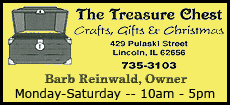|
Dear Mayor Davis-Kavelman, Professor Keller and other commission
members: Recently I urged the Abraham Lincoln Bicentennial
Commission of Lincoln, Ill., to erect a marker to commemorate Abe's
rally and speech of Oct. 16, 1858, in his first namesake town the
day after the last Lincoln-Douglas debate in Alton. This marker
would be in addition to the impressive kiosk planned. I have another
suggestion for the commission that directly relates to the rally and
speech, which, I understand, are also the subject of a proposed
painting. My suggestion, combined with the painting, kiosk and
marker, would create a unified set of highlights for the Lincoln
bicentennial birth year of 2009.

I make the following suggestion because I have read accounts of
the planning to date that indicate the need for something that would
motivate more public interest and participation in the celebration.
Specifically, Paul Gleason has said, "Wage-earners do not feel like
they're a part of the celebration." Alice Petrol advises to "involve
the youth, who need to be made aware of our wonderful heritage in
the community." Others have expressed the desire to make the
celebration a cooperative, countywide effort.
This suggestion would do all of these things, affording
opportunities for citizens young and old throughout the county to
participate. My proposal is in the spirit of Lincoln and Logan
County's founding father of heritage tourism, Les Sheridan. His
promotional projects were both visionary and doable (yes, "doable" is
a word and a good one).
My suggestion is to create a dramatic re-enactment (moving
pageant) of Abe's 1858 political rally and speech in his first
namesake town. This rally with Abe's speech was a major political
event attended by thousands from throughout central Illinois --
truly a "monster" rally, as an event of this magnitude was then
called. Most of this pageant cast would be locals dressed in period
costume to portray dignitaries and ordinary citizens. Perhaps the
Lincoln Community Theatre would be willing to help. A professional
Lincoln impersonator would be required if there is not someone local
who could take that role.

This pageant would be based on facts in the published accounts of
the rally and speech. There is no known copy of Abe's speech, but
with imagination, a researcher-writer could create an effective
pageant script, including Abe's speech, as described later in this
proposal. The re-enactment would feature typical crowd behavior of
that time as described in the record of the Lincoln-Douglas debates.
True to the political campaigns of that period, the pageant would
have both serious and comic elements, and would vividly bring
history to life.
This "monster" pageant would be a great challenge, but the town
whose fine civic spirit produced the extravaganzas of its 1953
centennial celebration and its 2003 sesquicentennial celebration (I
witnessed both) is surely capable of taking this suggestion and
running with it. Cities throughout Illinois will be vigorously
competing to attract tourists during the Lincoln bicentennial birth
year celebration. As original, historical street theater, this
pageant would give Lincoln and Logan County a distinct advantage in
this competition, and the pageant could be performed more than once.
This pageant could be presented during Heritage Days 2009 or as a
separate event early that October.
Let me summarize how the pageant might go. In anticipation of
Abe's arrival, local and county groups chant and sing as they march
around the square and then converge on the Lincoln train depot (Abe
arrived by train from Springfield). These groups carry signs that
proudly identify them from Atlanta, Broadwell, Elkhart, Lincoln,
Middletown and Mount Pulaski.

At the railroad depot, a brass band plays several tunes before
Abe appears, and a choir sings "Lincoln, We Are Proud of You," as
many in the crowd sing along. Abe emerges from the depot, smiling
and waving. He is greeted with wild applause and a cannon blast. He
is joined at the watermelon christening monument by Messrs. Latham,
Gillett and Hickox, and his local law partner, Samuel C. Parks. Mr.
Latham, perhaps the most distinguished founding father, has
laryngitis, so his wife speaks on his behalf. Mrs. Latham is
portrayed by Ms. Davis-Kavelman if she wants that role. She welcomes
Abe, introduces the others, and briefly refers to Abe's role in the
town's founding and christening.

Just before the dignitaries begin their walk to the courthouse, a
tipsy rascal loudly stumbles out from one of the watering holes on
Chicago Street across from the depot. He is accompanied by a sober
husband and wife. The rascal has a jug in hand, and he shouts that
he does not want to go hear Abe. The other two tell him he should go
because he might learn something. Police in period uniform
confiscate the jug, and the rascal's companions take him by the arms
as the trio merges into the crowd.
Abe and the dignitaries walk east on Broadway Street to the
courthouse lawn, led by the brass band. The county groups, chanting
and singing, lead the spectators to the courthouse. A low stage with
podium has been built on the west lawn of the courthouse, between
the courthouse steps and Kickapoo Street. The crowd gathers, and a
school choir sings "The Star-Spangled Banner." S.C. Parks introduces
Mr. Lincoln, mentioning that Abe and he work together on local
cases, so that Abe often visits his office, located in a building
just behind the crowd.
[to top of second column in this letter]

 |
 Abe thanks the crowd, and then he tells the story that he had
advised the town's founding fathers that nothing named Lincoln ever
amounted to anything. He praises the town for its early prosperity
and says the town may even grow to the point where it has its own
college -- maybe even more than one. He reminds the crowd that in
Illinois, U.S. senators are chosen by the state legislature, so he
urges the crowd to vote the Republican state ticket. He says as a
U.S. senator, he -- like the town of Lincoln -- is trying to amount
to something that would make the state and the country proud (wild
applause and cheers).
Continuing, Abe recaps the main points he made during the
debates. During the speech, a few spectators ask questions that lead
Abe to share the humorous parts of the debates, to the vocal delight
of the crowd (at least the several costumed cast, who are down front
and throughout the crowd). Abe closes by urging the crowd to vote
Republican to prevent the spread of slavery and preserve the Union.

Suddenly, everyone is surprised when Parks' male law clerk yells
from the second-story window of the building behind the crowd: "Mr.
Lincoln, Mr. Lincoln, don't forget to come to the office and sign a
couple of papers. You need to sign off on these cases so we can be
paid." Abe agrees to do just that.
Then, from the second-story window of the courthouse, a female
employee yells, "Abe, Abe, and don't forget to come up here to the
county clerk's office and pay taxes on that lot on the square that
you got last spring. If you don't pay your taxes, that lot will be
sold at public auction." Abe says he will take care of that business
very soon. (The speech segment of the pageant would take about 45
minutes, not the two hours Abe actually spoke.)
The brass band strikes up, and several in the crowd carry Abe on
their shoulders down Kickapoo Street to Latham Park, where the
public has a free watermelon feed. Abe shakes hands for about a
half-hour before the brass band and some of the crowd escort him
back to the depot. That night there is more revelry and dancing in
the streets.
The pageant would excite and unite the town and county in a
common public affairs purpose. This spectacle could attract many
from near and far who would be entertained, educated, and inspired
to take more interest in history and the Lincoln legacy. The
Illinois Abraham Lincoln Bicentennial Commission may have more grant
money in 2008 that could be sought specifically for this pageant.
The pageant would bring national and international media attention
as well as a lot of tourist dollars. DVDs could be made and sold
later.

The first Lincoln namesake town's Bicentennial Commission motto
is "Lincoln, Illinois -- the first city to live the legacy." A
central theme of Abe's legacy is striving tirelessly for public
service. What better way for Lincoln and Logan County to celebrate
the Lincoln legacy of public service than a pageant that would
demonstrate extensive civic engagement and stimulate interest in the
American political tradition?
Honoring Abe's legacy in this way would exemplify the mission of
the Illinois Abraham Lincoln Bicentennial Commission, which
"encourages every community and citizen to become involved.
Communities are encouraged to learn about their Lincoln stories
and explore ways to relate their Lincoln heritage in public events
and commemorative activities" (double emphasis mine). Also, this
pageant would distinguish this part of Illinois as one of the most
dedicated places in the nation to celebrate the Abraham Lincoln
heritage in his birth year.
And quite simply, this pageant would be a rompin', stompin' good
time for all.
Pageant title: "Abe's 1858 First Namesake Town Rally and Speech"
Web page that includes the historical facts of the rally and
speech:
http://www.geocities.com/
findinglincolnillinois/alincoln-lincolnil.html
#ignoredabespeech
Please forward, print and share, or publish this proposal as you
wish. Also, feel free reach me with comments or questions.
Sincerely,
Darold Leigh Henson, Ph.D.
Professor Emeritus of English
Missouri State University
dlhenson@missouristate.edu
http://english.missouristate.edu/faculty/henson.htm
http://www.geocities.com/findinglincolnillinois/
P.S. For your convenience, I have attached a readable JPEG of the
article in the Chicago Tribune that describes Abe's 1858 rally and
speech in his first namesake town. The attached photos were taken
during the Lincoln, Ill., bicentennial celebration of 2003. The
cannon was located behind the Postville Courthouse replica and
indicates that perhaps one can be fired in town without breaking
windows. (Christening
re-enactment)

P.S.S. Once the commission finalizes its special events, I am
willing to create a Web page in my Lincoln community history Web
site about them. Then, a request could be made to the Illinois
Abraham Lincoln Bicentennial Commission to add a link to that
page to its list of other Illinois Abe celebration Web sites. (My
Lincoln Web site has been averaging more than 200 hits per day.)
[Posted
December 05, 2007]
Click here to send a note to the editor
about this letter. |